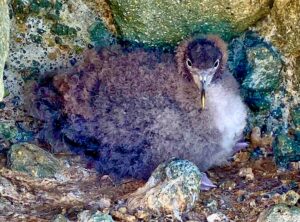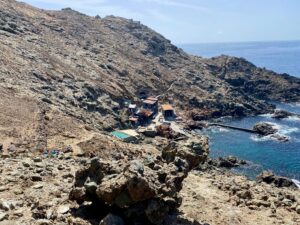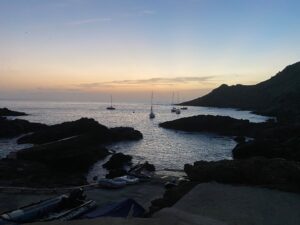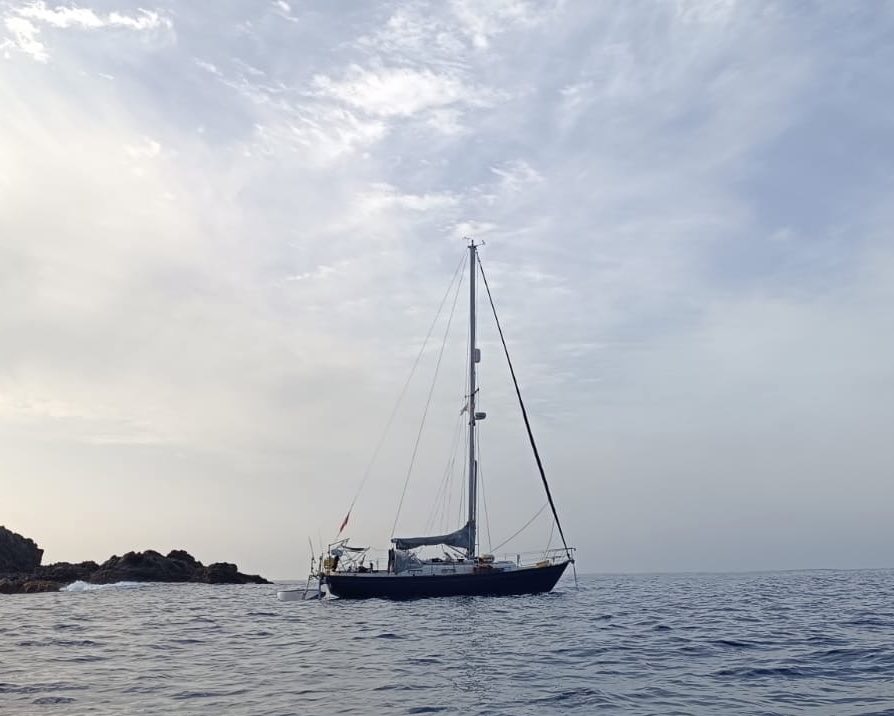And then it went splash. The banana boat capsized along with its contents. This consisted of me, my non-waterproof shoulder bag containing my passport, mobile phone and ship’s papers, plus flip-flops and a scoop. The latter was now completely useless, because the banana boat danced up and down, keel over, alongside Blue Alligator’s side in the swell and was full anyway.
A banana boat is a great thing, actually. „Unsinkable, indestructible and portable“ is the advertising slogan the German manufacturers have given the folding boat. Not undeservedly, as it just turned out. For the banana boat did not sink. Whether it is indestructible, I do not know. But the company gives a lifetime guarantee on the boat. And who would do such a thing if they didn’t know for sure that no lawsuits would come. But the banana boat can certainly capsize, as I experienced.
It can capzise
I knew that the boat was a bit tippy. However, I hadn’t used the thing, which is quite wide and has a relatively flat bottom, for over a year and must have leaned a little too far out to the side as I set about to loosen the oars from the bracket and manoeuvring them onto the deck of Blue Alligator. In any case, it happened in a flash. One side of the boat dipped under and we were upside down. I was transported under the white plastic shell of the boat with its fancy blue welds or however the plastic shells are held together. I came back to the surface relatively quickly and first threw the bag with its precious contents onto the deck of the yacht. I feared the worst: soggy paper, a destroyed iPhone, a useless passport.
Of course, I had not attached a swim ladder. Blue Alligator doesn’t have a particularly high freeboard and athletic people can certainly hoist themselves up easily. Only, I’m not exactly athletic and my pull-ups are rather modest. So I swam between the overturned banana boat and Blue Alligator like a spigot on a fishing line.
Almost like in the movie
There’s a film about yachties who jump overboard in the middle of the ocean to cool off and then drown because, like me, they were stupid enough to forget the swim ladder. I found the film a bit boring because the end was predictable. If you are in such a situation yourself, your views change.
I didn’t drown, however, but was picked up by other sailors who conveniently rowed by in their inflatable dinghy (certainly not unsinkable – if the air is out – and not indestructible either. But perhaps it will not capsize easily?). From their dinghy, I got back on board of Blue Alligator and with the help of one of the rescuers we hoisted the banana boat onto the deck of the yacht as well. I hereby would like to thank my two saviours, Duco and Marjolijin from Blauwe Zwaan.
But why had I got into this predicament in the first place, exposing such a vulnerable cargo to the dangers of dinghy travel?
On the «Wild Islands»
I had dropped anchor in the Cagarros Bay of Selvagem Grande. Selvagem Grande, as the name suggests, is the larger of two islands between Madeira and the Canary Islands. The „Wild Islands“ belongs to Portugal, although they are closer to the Canary Islands. But the Spaniards had not wanted them back then, when the world had been divided between the two emerging great Iberian powers. The Selvagens remained Portuguese and have been a nature reserve since 1971.

A little Cagarro in its nest on Salvagem Grande.
The protection is primarily for the more than 44,000 couples of cagarros that give birth to their offspring on the island. Cagarros are elegant seabirds about the size of a seagull, but with brownish plumage on their backs and wings (in English they are called Cory’s Shearwater). They spend practically their whole life at sea. But eggs cannot be laid on water. That’s why they depend on rocky coasts with enough nesting holes. That’s what they have on the Selvagens, and in almost every hole on the island, which looks like a huge, dirty sponge and is only sparsely covered with a few species of herbs and shrubs, a chick squats in its black-greyish juvenile dress at the end of September.
Because they are tasty
Until the Selvagens were declared a protected area, the poor little birds had pretty short life. Thousands of them were dragged out of their caves by fishermen and killed. Their meat was salted on the spot, because it was (and still is, for example, on the Azores) considered extremely tasty. The Cagarros were almost wiped out.
Today, fortunately, no one lays a hand on the feathered gurgles, and the birds take it in their stride when curious visitors hold their mobile phone cameras in front of the nesting cavities.
They are guarded by three park rangers, a biologist and two policemen from the Polícia Marítima – although the policemen are not on the island because of the birds, but because the Spanish would like to have the Selvagens today after all. Not because of the islands, of course, but because of the sea around them and the mineral resources that are said to lie there in the bottom. But the Portuguese don’t think of giving up the islands. That’s why two policemen are bored for 21 days at a time until they are relieved.
Entertainment for bored policemen
Fortunately, that’s why there are the sailors who come to visit and who, of course, have to register. For this reason, I had rowed ashore with all my documents and had done my duty to the authorities.

The buildings where the park rangers and the police officers live.
Later, the policemen were to pay me and the other yachts a visit as well. Taking advantage of the opportunity – when can you check five yachts at once – they asked if we had paid the lighthouse tax due in Portugal (I had). They also took the opportunity to check the fire extinguishers on board, so I had to rip two out of three out of their holders and hand them over into the hands of my visitors. „Time to replace them,“ said the one policeman, a bald man with a double chin.
Unlike the park rangers, he only comes to the Selvagens once a year. Otherwise he sits in an office in Funchal and checks documents, which is why he doesn’t have nearly the atlethic figure of the park rangers. But he must have felt at that moment like the sheriff in a godforsaken place in the Wild West when villains finally come riding in.
But we weren’t villains, we were all properly equipped sailors. Okay, the flares had expired in August. But it was only September.
I rowed back and forth a total of three more times between Blue Alligator and the slippery jetty in the bay without falling into the water again. Routine pays off.
The reason for one of the visits was to share a meal with the park rangers, the police officers, the biologist and the crews of the other yachts. One of the sailors, Miguel Toscano from the Ouf (the yacht is actually called that: Ouf) had run a restaurant on Faial and cooked a traditional feijoada for all of us. After the hearty bean stew, you’re not hungry for 24 hours, but you have some flatulence.

Sunset on Selvagem Grande and our yachts in the Baia dos Cagarros.
So I spent a wonderful evening in good company overlooking the bay where our boats were anchored. The sun was setting in a spectacle of reds and blues and as darkness settled over the water, we heard the cries of returning cagarros. They sounded quite fancy, something like Mickey Mouse on helium. The chicks would now soon get their fish – the ones whose parents made it back – and we returned to the yachts full and not too drunk.
Goodbye Selvagens
The following day we weighed anchor and set course for Santa Cruz de Tenerife. I am writing these lines in a completely different world. Behind me is a big city with its bustle and noise. I am lying in a crowded harbour. At night, instead of stars, glaring streetlights shine above me. And of course there are no Cagarros flying through the air.
If I can, I will return to the Selvagens. Their seclusion, the peace there and the birds have left something in my soul like the imprint of a stamp.
Speaking of which: the ship’s documents, the passport and even the mobile phone survived the swim in the Atlantic unscathed. But I will get myself a waterproof bag. I promise.

Pingback: Kentern auf den Selvagens - Meergeschichten
Great stuff Ronny! Stay safe, have fun
Thank you John!
Pingback: To the Cape Verde Islands – or the expansion of the horizon - Meergeschichten